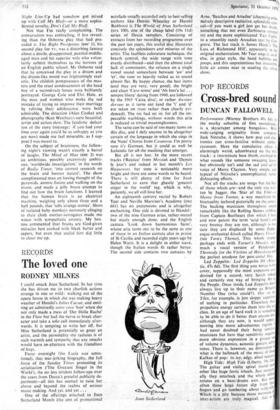RECORDS
The loved one
RODNEY MILNES
I could smack Joan Sutherland. In her time she has driven me to two churlish actions strange in one so mild: walking out of the opera house in which she was making heavy weather of Handel's Julius Caesar, and emit- ting an admittedly sotto voce 'boo' when she not only made a mess of 'Der Holle Rache' in the Flute but had the nerve to break chan acter and take a solo call immediately after- wards. It is tempting to write her off, but Miss Sutherland is potentially so great an artist, and the personality she radiates is of such-warmth and sympathy that any smacks would have .to-alternate with the friendliest of hugs.
Fame overnight (the Lucia was sensa- tional), that tear-jerking biography, the full force of the Sunday Times promoting its serialisation (The Greatest Singer in the World'), the no less strident follow-ups over the years from Decca's grateful publicity de- partment—all this has seemed to raise her above and beyond the realms of serious
• music making. And yet, and yet ... One of the offerings attached to Joan Sutherland Month (the sort of promotional
accolade usually accorded only to best-selling authors like Dennis Wheatley or Harold Robbins) is The World of Joan Sutherland (SPA 100), one of the cheap label (19s 11d) series of Decca samplers. Consisting of extracts from her recording programme over the past ten years, this useful disc illustrates concisely the splendours and miseries of the artist. The faultless coloratura technique, the breath control, the wide range with tone evenly distributed—and then the almost total lack of consonants, the reliance on a single vowel sound somewhere between `aw' and `er', the tone so heavily veiled as to sound almost flat. By happy chance, the best items (and they are very, very good), the bright and clean 'Caro nome' and `Ah fors'e lui sempre libera' dating from 1960, are followed by the 1965 'Casta diva', or rather Awstaw dervaw as it turns out (and the 't' and 'd' are taken on trust rather than clearly evi- denced). The rot had set in; for all the im- peccable warblings, without words this aria is reduced to trivial meaninglessness.
The same can be said of too many items on this disc, and I defy anyone to be altogether certain of the language in which she sings in the Nuns' Chorus from Casanova. I'm pretty sure it's German, but it could as well be Icelandic for all the meaning that emerges.
But all is not lost. In the more recent tracks (`Rejoice' from Messiah and 'Depuis le jour') and indeed in last month's Les Huguenots, her tone is noticeably more bright and there are some words to be heard. There is still plenty of time for Joan Sutherland to earn that ghastly 'greatest singer in the world' tag, which is why, patiently, we all still love her.
An eighteenth century recital by Robert Tear and Neville Marriner's Academy (zao 661) has no pretensions and is altogether enchanting. One side is devoted to Handel: two of the nine German arias, rather-muted but nicely enough done, and the English cantata 'Look down harmonious Saint', whose aria turns out to be the same as one of those in an Italian cantata also in praise of St Cecilia and recorded eight years ago by Helen Watts. It is a delight in either stave, though the Italian words fit rather better. The second side contains two cantatas by Joan Sutherland
Arne, 'Bacchus and Ariadne' (charming arias, naively descriptive recitative, splendidly cyni. cal—if you want a girl just get her drunk, something that not even Zerbinetta stooped to) and the more sophisticated 'Fair Cada' to a smoothly randy Arcadian text by Con- greve. The last track is James Hook's 'T Lass of Richmond Hill', apparently in the original orchestration. Mr Tear sings it. as all else, in great style, the band bubbles and poops, and this unpretentious but irresistible little air comes near to stealing the whole show.










































 Previous page
Previous page